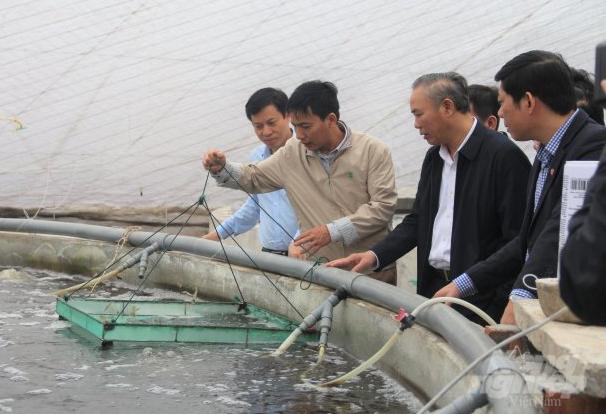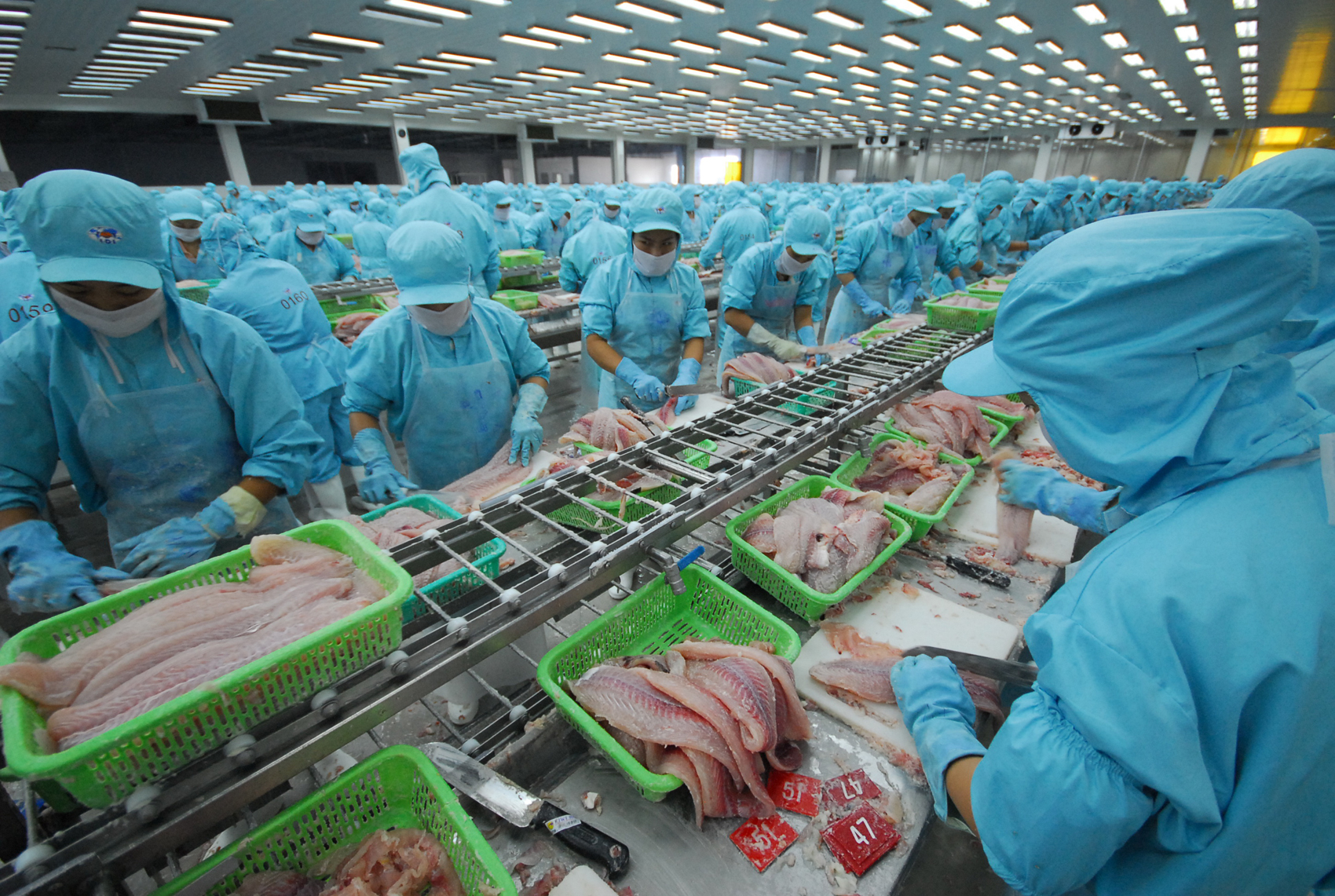November 28, 2025 | 03:51 GMT +7
November 28, 2025 | 03:51 GMT +7
Hotline: 0913.378.918
November 28, 2025 | 03:51 GMT +7
Hotline: 0913.378.918

Deputy Ministry of Agriculture and Rural Development Phung Duc Tien visits a shrimp cultivation model in Thai Binh. Photo: Pham Hieu.
As the assessment of Deputy Minister of Agriculture and Rural Development Phung Duc Tien, the year of 2020 was a challenging time for the agricultural sector. Apart from the Covid-19 outbreaks, Vietnam was continuously hit by natural disasters. Especially floods in the Central region, salt water intrusion and hail storms wreaked havoc in fisheries and aquaculture. However, the Vietnamese seafood industry still achieved set targets.
The Covid-19 pandemic has severely affected and had negative effects on the global economy. In that context, many countries conducted vaccination campaigns and saw positive results. Many countries recovered fast and have experienced very rapid economic growth.
Deputy Minister Phung Duc Tien analyzed: "During the Covid-19 outbreaks, many supply chains were disrupted, Vietnam's rivals for seafood export also faced difficulties. Vietnam has successfully contained the Covid-19 outbreaks which becomes an opportunity for us to organize production ready for exporting aquatic products to the large markets as what we did over the past years."
" The time when the world's food supply chain has been broken Vietnam gradually contained the Covid-19. It is a favorable condition for seafood industry to accelerate and it is an opportunity we need to grasp and judge the situation right to get good results" the MARD Deputy Minister said.
The covid-19 pandemic affected the trades of seafood products in almost markets in 2020. However, Vietnam still saw an increase of seafood exports to some markets including the US up nearly 10%, the UK up 23%, Canada up 14%, Russia up 31% and Australia up 10%. Stable supply and diversity of products have met the changing tastes of consumers in different countries in the context of the Covid-19.

It 's golden time for seafood industry to accelerate exports. Photo: NNVN.
With the impacts of the Covdi-19 pandemic on the seafood industry, Directorate of Fisheries under the MARD has regularly monitored the production situation of localities nationwide ; thereby timely giving directions to strengthen the control of fishing vessels at ports, ensuring both epidemic prevention and exploitation activities.
In addition to the orientation of processing for exports in recent years, the seafood industry has seen an increasing demand for processed seafood in the domestic market in the context the Covid-19 pandemic has caused difficulties for seafood exports.
Especially, fresh seafood and aquaculture products make important contribution to ensuring sufficient supplies of clean and safe food and providing nutrients for the people. Moreover, it also helps fishermen change their practices of fishing, paying attention to preservation and shortening exploiting time to have fresh and tasty products for the domestic market.
According to Vietnam Directorate of Fisheries, in 2020 with the guidance of the MARD, services, agencies and associations operating in the fishery sector sped up the consumption in the country. Through connections, cat fish was welcomed in the domestic market, especially the northern markets.
In addition, many enterprises has built production and development strategies for the domestic market. This is an important solution to balance exports with domestic consumptions.
Besides, the seafood industry is also very flexible in the traditional export products. The relevant authorities have asked export processing facilities to have products to directly serve households and they can be used instantly in the context of social distancing.
These orientations and experiences can help the fishery industry adapt to changes suiting to the new situation in both domestic and overseas markets, thereby taking advantages of their strengths as well as the domestic market.
In 2020, Vietnam's total seafood output reached 8.45 million tons of which the exploited output reach 3.83 million tons and farm-raised output reach 4.6 million tons. The export value of seafood gained US$ 8.5 billion.
In 2021, the Prime Minister issued Decision No.339/QĐ-TTg approving Vietnam's fishery development strategy until 2030 with a vision to 2045. It targets by 2030 the total seafood output will reach 9.8 million tons of which the exploited output reaches 2.8 million tons and farm-raised output reaches 7 million tons. The value export reaches US$14-16 billion.
/2025/11/27/3830-1-152901_403.jpg)
(VAN) Dong Nai is developing its key crop areas, expanding planting area codes, and applying high technology to increase the value of agricultural products, aiming at a green and sustainable agriculture.

(VAN) Tay Ninh’s livestock sector is undergoing a major transformation, applying high-tech, closed-loop circular models to build sustainable value chains.
/2025/11/26/3627-4-082628_818.jpg)
(VAN) From a small café on the red basalt highlands, Le Van Hoang started a business with clean coffee, building Enjoi Coffee into a symbol of organic agriculture in the Lam Dong plateau.
/2025/11/25/0045-1-135246_13.jpg)
(VAN) Ca Mau is researching a model of sea-encroaching embankments combined with viaducts and logistics service zones, aiming both to prevent erosion and create land funds for marine economic development.

(VAN) The information was shared at the seminar 'Urban Agriculture - Solutions for Developing Green Spaces,' organized by the Kinh te & Do thi Newspaper and the Biotechnology Center of Ho Chi Minh City.
/2025/11/19/4141-2-132831_216.jpg)
(VAN) One of Japfa's outstanding solutions is implementing digital transformation and artificial intelligence (AI) to optimize operations, enhance productivity, and advance sustainable development.
/2025/11/19/4847-1-093540_448.jpg)
(VAN) The Gia Lai Provincial People’s Committee had a working session with the delegation of the U.S. Department of Agriculture, the State of Idaho, and representatives of the State's leading enterprises.